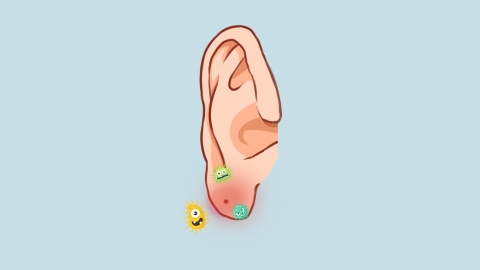What should I do if my ear piercing is infected?
Under normal circumstances, ear piercing inflammation may be caused by factors such as inappropriate earring materials, inadequate cleaning and care, local bacterial infection, foreign body irritation in the piercing site, or contact dermatitis. It is recommended to seek medical attention promptly, identify the underlying cause, and then improve the condition under a doctor's guidance through general care measures, medication, and other treatments. The specific causes are analyzed below:

1. Inappropriate earring material: Wearing earrings made of allergenic materials such as nickel alloys or copper can irritate the skin around the piercing, leading to inflammation characterized by redness, swelling, and itching. Immediately remove the allergenic earrings and switch to hypoallergenic materials such as sterling silver, pure gold, or medical-grade titanium to reduce skin irritation.
2. Insufficient cleaning and care: Failure to clean the piercing site regularly during the healing process can lead to accumulation of sweat and dirt, promoting bacterial growth and causing inflammation, often accompanied by mild pain and discharge. Clean the piercing and surrounding skin 2–3 times daily using a cotton swab dipped in medical alcohol or iodophor. Remove any discharge and avoid touching the area with hands to prevent worsening bacterial infection.
3. Local bacterial infection: When the skin around the piercing is damaged, bacteria such as *Staphylococcus aureus* can invade and cause infection, resulting in noticeable redness, swelling, pain, and pus discharge. Patients should follow medical advice to apply topical medications such as mupirocin ointment, fusidic acid cream, or compound polymyxin B ointment to the affected area.
4. Foreign body irritation: During the healing process, residual debris such as dirt or fragments of earrings may remain in the piercing and chronically irritate the skin, causing persistent itching and inflammation. Seek medical help for removal of the foreign body using sterile instruments. Afterward, clean the piercing daily with saline solution and apply recombinant human epidermal growth factor gel to promote wound healing.
5. Contact dermatitis: Exposure to allergens such as earrings or skincare products can trigger an inflammatory skin reaction, leading to piercing site inflammation accompanied by redness, papules, and itching. Patients should take antiallergic medications such as cetirizine hydrochloride tablets, loratadine capsules, or ebastine tablets as directed by a physician.
In daily life, avoid frequently touching the piercing, refrain from sleeping on the inflamed ear, and minimize friction. Diet-wise, reduce intake of spicy and irritating foods, consume more fresh vegetables and fruits, and increase vitamin intake to help reduce inflammation and support wound healing.




